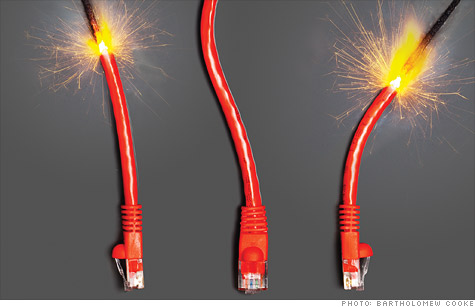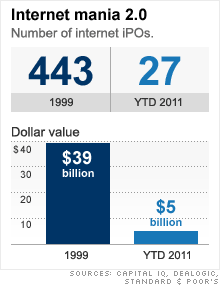
(MONEY Magazine) -- Look at how the shares of young tech companies are doing these days, and you might think you've got a bad case of déjà vu.
When LinkedIn (LNKD), the professional networking site, went public in May, the stock more than doubled its first day. Groupon, the local-deals site, is expected to begin trading soon, but already the firm is worth some $30 billion -- around Target's (TGT, Fortune 500) stock market value, even though the retail giant pulls in 60 times more sales.

There's reason to approach this new Internet boom carefully. Even though the Web has matured, the lure of finding the next big thing is attracting a lot of hot money. Today's dotcom stocks fall into three distinct categories, each with its own set of opportunities and risks. Here's the lowdown:
Sites that tie communities and consumers together probably represent the future of the Internet. But if the 2000 dotcom debacle taught you anything, it was that the price you pay for "potential" matters.
By the time Facebook goes public, expected next year, it could be valued at more than $100 billion -- heady stuff for a firm with only around $2 billion in sales, according to Bloomberg.
It's unclear how these social-networking sites will earn enough money to reward investors anytime soon at these valuations.
"That's what has me scared about the recent crop of IPOs," says University of Florida finance professor Jay Ritter, who has written extensively about initial public offerings.
Your move: Invest in the theme, not the IPOs.
You don't have to bet on an untested company. Google (GOOG, Fortune 500) is keenly aware that to remain the Internet's dominant player, it must compete with Facebook.
After struggling with social media for years, the company is now finding success through a variety of efforts ranging from YouTube to its new +1 button, which lets Google users inform their Gmail contacts of things they like on the web, to Google+, a social-networking site that pulled in 10 million users in just its first two weeks.
Face it, Google. You're a portal.
No longer an upstart, Google is expected to grow its earnings 18% annually for the next five years. That might pale in comparison to LinkedIn, whose growth rate is closer to 80%. Then again, Google's price/earnings ratio is 15, based on estimated earnings, vs. 597 for LinkedIn.
Two-thirds of this year's tech IPOs have originated abroad, many in the emerging markets. While there's huge potential for growth there -- in China, 450 million people are online, but that's just a third of the country -- many of these firms face unique hurdles.
The Chinese search engine Baidu (BIDU), for example, has to grapple with censorship and slower Internet load times. And in many markets, no single firm dominates any segment of the web. "I don't believe there's a Facebook of China yet," says Michael Oh, manager of the Matthews Asia Science and Technology Fund (MATFX).
Your move: Avoid them for now.
If you own a foreign growth-stock fund, you already own a smattering of these names. It's best not to add to that stake until things shake out.
The Internet has proved to be an efficient place to sell stuff. And more firms will get that chance now that people are spending more time online via iPads and smartphones.
Your move: Explore this group, but carefully.
Groupon is one of the largest daily coupon sites. But Alex Motola of the Thornburg International Growth Fund (TIGCX) notes that its specialty is easy to copy.
Look for businesses that can defend their turf, thanks to features, such as steady subscription-based revenue or key relationships. And focus on companies whose sales are growing significantly faster than their peers, says Colin Sebastian, an analyst at Robert W. Baird.
Ancestry.com (ACOM), a genealogy-research site that went public in 2009, has boosted sales 22% on average for the past three years -- twice the industry standard. And it draws six times the traffic of its closest U.S. competitor. Shares of this $2 billion company are trading at a P/E of 30, based on forecasted earnings.
Boingo Wireless (WIFI), operates Internet hot-spots in airports, hotels, and restaurants. Revenue from partnerships with businesses like Verizon, Krispy Kreme, and Chicago's O'Hare Airport grew 47% last year. Yet the stock, which went public in May, trades at a P/E of just 18. That's not dirt cheap, but it's not nuts. ![]()